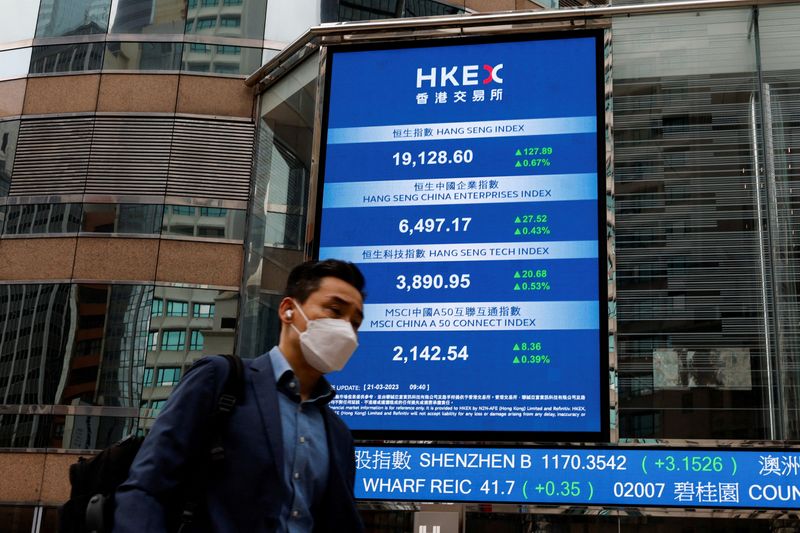By Jamie McGeever
(Reuters) - A look at the day ahead in Asian markets from Jamie McGeever, financial markets columnist.
Barring a collapse of 1.5% or more on Friday, Asian stocks are about to chalk up their first weekly rise in four, but will this mark a turning point or merely a temporary lifting of the gloom?
The answers to that will begin to unfold next week as investors give their verdict on what comes out of the Federal Reserve's Jackson Hole Symposium, particularly Chair Jerome Powell's speech on Friday.
The latest Tokyo inflation figures for July top Asia's economic data calendar on Friday, offering an insight into Japan's national inflation picture and potential implications for Bank of Japan policy in the coming months.
The market mood in Asia on Friday will be one of caution - Wall Street sold off sharply on Thursday, the dollar had its biggest rise in a month to hit a 10-week high, and investors are reluctant to be too gung-ho ahead of Powell's remarks.
The MSCI Asia Pacific ex-Japan index rose 1.5% on Thursday, its best day in a month. But despite this flurry, August has been a bruising month and the index is on track for its steepest monthly fall since September last year.
Broadly speaking, Asia-Pacific stocks seem reasonably priced right now, trading roughly in the middle of their long-term ranges and standard deviation levels. Indian stocks are by far the most expensive, and China's are the cheapest.
China's economic, market and policy challenges this year have been well documented, so stocks are cheap for good reason. There's little to suggest these issues will be fixed any time soon, so decent market bounces like Thursday's will probably continue to be the exception rather than the rule.
Foreign investors were buyers of Chinese stocks on Thursday for the first day in 13, according to Stock Connect data, a long stretch of outflows which authorities in Beijing will be hoping is not repeated.
Tech stocks could come under extra pressure following the Nasdaq's 1.9% slump on Thursday, a slightly perplexing fall given long-dated bond yields didn't rise that much and Nvidia (NASDAQ:NVDA) managed to close in positive territory. Just.
The macro focus in Asia on Friday shifts to Tokyo inflation. The annual rate for July is seen easing below 3% for the first time since September last year.
The dilemma for Japanese policymakers runs deep. National core inflation has exceeded the central bank's 2% target for 16 straight months, as firms continue to pass on higher import costs driven in part by the weak yen.
Worried about hurting a fragile economy, the BOJ has stressed its resolve to keep interest rates ultra-low even as it decided last month to raise a cap on long-term bond yields.
Here are key developments that could provide more direction to markets on Friday:
- U.S. Fed's Jackson Hole Symposium

- Japan Tokyo CPI inflation (August)
- Malaysia CPI inflation (July)
(By Jamie McGeever; Editing by Josie Kao)